Getting Started
Welcome new instructors and instructors with renewed interest in improving your courses.
Great teachers commit to professional change and we are encouraged to see that you have made a personal commitment to continue learning about teaching and how to improve upon your course or courses. The faculty resources section, which begins on this page, is designed to help you find and learn about new teaching techniques.
If you are new to teaching at the college or university level or are new to teaching at NDSU, this section provides general information about what to expect, as well as what is expected of you as an instructor.
Also, view our FREE printables with hints and tips for a successful semester >>
The link at the bottom of each page will move you through the faculty resources section in order, otherwise you can skip to the most important topics by using the menu bar above.
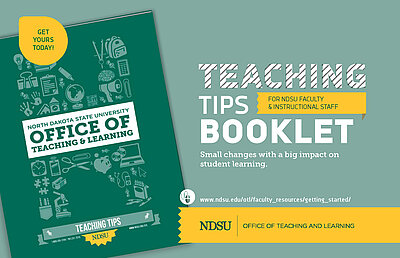
Teaching Tips Postcard
View in PDF | Audio(MP3)
Distribute this postcard at your next faculty or graduate teaching assistant meeting.
General Expectations
The following skills are essential for instructors regardless of the format in which they teach:
- Teaching experience
- Solid knowledge of and enthusiasm for the subject matter
- Good organizational and time-management skills
- Strong writing skills and comfort communicating in writing
- Comfort with technology
- Flexibility in teaching methods and approaches
- A willingness to be responsive to students and provide timely feedback
Developing materials suitable for the web, and choosing the best resources to go along with those materials, can be time consuming, especially if you are preparing to teach the course for the first time. In general, expect an online class to take more time and energy to teach than a face-to-face class. Once the course begins, keeping up with student communication and feedback is also an on-going time demand for instructors.
Tip: If time allows, prepare for an online class experience by shadowing another instructor who is already engaged in online teaching. This can be an excellent way to get "real-world" experience, form mentoring or collegial support relationships, and generate positive feedback for course development and improvement. Whether you are teaching online or face to face, you may want to participate in our Peer Teaching program to further refine your class.
Establishing a Teaching Philosophy
Resources for establishing and writing your personal teaching philosophy.
Center for Research on Learning and Teaching - University of Michigan
This website includes an extensive list of sample teaching philosophy statements. View more information about Teaching Philosophies.
Printables
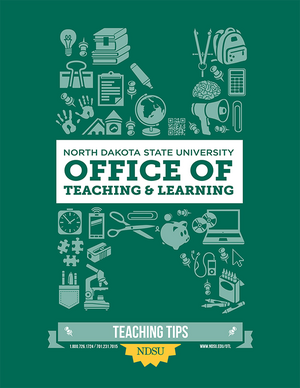
2023 Teaching Tips Booklet
A booklet that includes various tips to assist you in your teaching. Updated yearly.
View in PDF | Printer Friendly Version >>
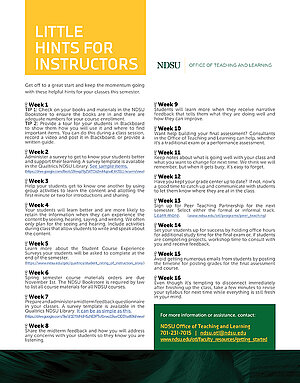
Little Hints For Instructors
A list of helpful hints for each week of the semester.
View in PDF | Audio (MP3) >>
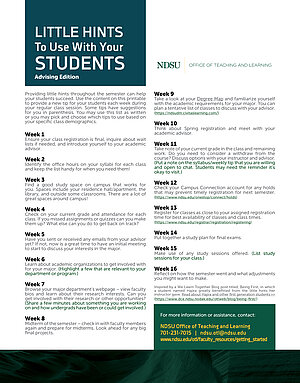
Little Hints To Use With Your Students - Advising Edition
A list of helpful hints regarding advising. Provide your students little reminders throughout the semester to help them be more independent and successful.
View in PDF | Audio (MP3) >>
First Day Toolkit
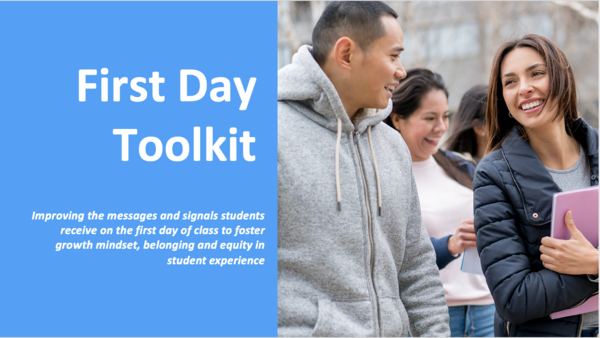
The First Day Toolkit is a suite of resources, offered by the Student Experience Project, designed to help institutions engage instructors in revising their syllabi and other messages that students receive on the first day of class to create an inclusive and supportive learning environment. By fostering a positive student experience in the classroom, institutions can increase a student’s likelihood of persevering through academic challenges to graduation.
These modules are FREE, but you must sign up using your name and email address.
Tips From the Learning and Applied Innovation Center
View ITS's list of tips for the beginning of each semester >>
View a checklist for beginning a HyFlex class >>
Assistance and Support
You don't have to go it alone. Every course is unique and the planning and development process includes many steps and considerations. The Office of Teaching and Learning, its affiliated staff, and the Learning and Applied Innovation Center offer an array of services to support you, including:
- Course content planning
- Instructor and department support
- Technology planning and support
- Multimedia development services
- Blackboard and other software training
- Podcasting and vodcasting assistance
- Reference and training materials online
We can help you determine what pedagogies and technologies are the best choice for your course and help you prepare. We provide workshops, online support information through this website, and personalized assistance by appointment. Contact OTL today!


